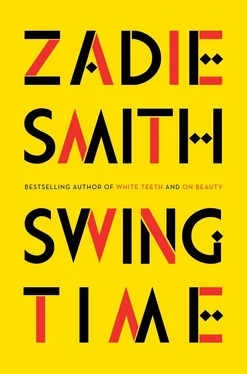My favorite part of each day became the early evenings, when I would walk over to Fern’s and have a simple dinner with him in the pink house, cooked for us by the same ladies who fed the school. A single tin bowl, full of rice, sometimes with just a green tomato or garden egg buried in it somewhere, other times with an abundance of fresh vegetables and a very skinny but delicious fish laid on top which Fern graciously let me tear at first. “We are kin now,” he told me, the first time we ate like this, two hands in the same bowl. “They seem to have decided we’re family.” Since our last visit the generator had broken down, but as we were the only ones to use it Fern considered this a “low priority”—for the same reason I considered it a high priority — and refused to lose a day traveling to the city in search of a replacement. So now, once the sun went down, we strapped on our little head-torches, making sure to wear them at an angle so as not to blind each other, and talked late into the night. He was good company. He had a subtle, compassionate, intricate mind. Like Hawa, he didn’t get depressed, but he managed this not by looking away but by looking closely, attending to each logical step in any particular problem, so that the problem itself filled all available mental space. A few nights before the party, while we sat considering the imminent arrival of Granger and Judy and the rest — and the end of a certain peaceful version of our life here — he began to tell me of a new problem, at the school: six children missing for two weeks from their classes. They were unrelated to each other. But their absences had all begun, the headmaster told him, on the day Fern and I arrived back in the village.
“Since we arrived?”
“Yes! And I thought: but this is odd, why is it? First, I ask around. Everybody says: ‘Oh, we don’t know. It’s probably nothing. Sometimes the children have to work at home.’ I go back to the headmaster and get the list of names. Then I go through the village to their compounds, one by one. Not easy. There’s no address, you have to follow your nose. But I find everybody. ‘Oh, she is sick,’ or, ‘Oh, he is visiting his cousin in town.’ I have the feeling no one tells me the truth. Then I am looking at the list today and I think: these names are familiar. I go back to my papers and I find this microfinance list — you remember? — this thing Granger did, independently. He is a sweet man, he reads a book on microfinance… Anyway, I look at this list and I find it is the same six families exactly! The mothers are all the same women Granger gave these thirty-dollar stakes, for their market stalls. Exactly the same. So I think: what is the connection between the thirty-dollar stake and these missing children? Now it’s obvious: their mothers, who could not repay their debt on whatever schedule Granger has arranged with them, they assume the money will be taken coin by coin, from their children’s school fees, and the children will be shamed! They see us back in the village, ‘the Americans,’ and they think: better keep these kids at home! It’s smart, it makes sense.”
“Poor Granger. He’ll be disappointed. He meant well.”
“No, no, no… it’s easily resolved. It’s just for me an interesting example of follow-through. Or of not following through. The financing is a good idea, I think, or not a bad idea. But we may have to change the repayment schedule.”
Through one of the blown-out windows I saw a bush taxi rumble down the one good road in the moonlight. Kids hung from it even at this hour, and three young men lay on their bellies on its roof, holding down a mattress with the weight of their own bodies. I felt that wave of absurdity, of pointlessness, that usually caught me in the earliest hours, laying wide awake next to a deep-sleeping Hawa as the roosters went berserk on the other side of the wall.
“I don’t know… Thirty dollars here, thirty dollars there…”
“Yes?” said Fern brightly — he often failed to pick up on tone — and when I looked up I saw in his face so much optimism and interest in this small, new problem that it irritated me. I wanted to crush it.
“No, I mean — look, you go into the city, to every other village around here, you see these Peace Corps kids, the missionaries, the NGOs, all these well-meaning white people busy worrying about a few trees — as if none of you see the forest!”
“Now you are the one speaking in proverbs.”
I stood up and began urgently burrowing through the pile of supplies in the corner, looking for the Calor gas stove and the teapot.
“You wouldn’t accept these… microscopic solutions in your homes, in your countries — why should we accept them here?”
“‘We’?” queried Fern and then began to smile. “Wait, wait.” He came over to where I was wrestling with the gas canister and bent down to help me attach it to the ring which in my bad temper I was managing badly. Our faces came very close to each other. “‘These well-meaning white people.’ You think far too much about race — did anyone ever tell you this? But wait: to you I am white?” I was so startled by the question I started to laugh. Fern drew back: “Well, it’s interesting for me. In Brazil we don’t understand ourselves as white, you understand. At least my family does not. But you’re laughing — this signifies yes, you think I am?”
“Oh, Fern…” Who did we have out here except each other? I directed my torch away from where it had lit up the sweet concern in his face, which after all was not much paler than mine. “I don’t think it matters what I think, does it?”
“Oh, no, it matters,” he said, returning to his chair, and despite the dead bulb above our heads I thought I saw him blush. I concentrated on looking for a small and exquisite pair of Moroccan glass tumblers with a green stain. He told me once that he carried them everywhere with him on his travels, and this admission was one of the few concessions I ever heard Fern make to personal pleasure, to comfort.
“But I am not offended, no, all of this it is interesting to me,” he said, sitting back in his chair and stretching out his legs like a professor in his study. “What are we doing here, what is our effect, what will be left behind as legacy, and so on. It all has to be thought about, of course. Step by step. This house is a good example.” He reached to his left and patted a patch of exposed wiring in the wall. “Maybe they paid off the owner or maybe he has no idea we are in it. Who knows? But now we are in it and all of the village sees we are in it, and so now they know that it belongs, in essence, to nobody, or to anybody the state on a whim decides to give it to. So what will happen when we leave, when the new school is up and running and we don’t visit here much any more — or at all? Maybe several families will move in, maybe it will become a community place. Maybe. My guess is it will be taken apart, brick by brick.” He took off his glasses and massaged them with the hem of his T-shirt. “Yes, first someone will take the wires, then the sheeting, then the tiles, but eventually every stone will be repurposed. This is my bet… I may be wrong, we will have to wait and see. I am not as ingenious as these people. No one is more ingenious than the poor, wherever you find them. When you are poor every stage has to be thought through. Wealth is the opposite. With wealth you get to be thoughtless.”
“I don’t see anything ingenious about poverty like this. I don’t see anything ingenious about having ten children when you can’t afford one.”
Fern put his glasses back on and smiled at me sadly.
“Children can be a kind of wealth,” he said.
We were silent for a while. I thought — though I really didn’t want to — of a shiny red remote-control car, bought from New York for a young boy in the compound of whom I was especially fond, but it had come with the unforeseen problem of batteries — unforeseen by me — batteries for which there was sometimes money, most of the time not, and so the car was destined for a shelf I had noticed Hawa kept in the living room, filled with decorative but fundamentally useless objects, brought by clueless visitors, to keep company with several dead radios, a Bible from a library in Wisconsin and the picture of the President in a broken frame.
Читать дальше












